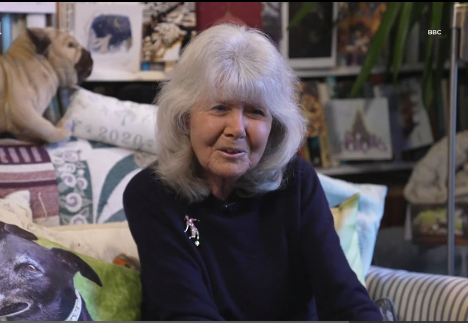Jilly Cooper, whose sudden literary rise turned her from a struggling journalist into a £10 million powerhouse of popular fiction, is one of the few writers who has successfully combined sex, satire, and society. She had not only established herself as a cherished part of British culture by the time of her death in 2025, but she had also left behind a remarkably stable financial legacy for someone who had once been afraid of losing her house.

Cooper had to balance a lot of things in the early 1980s. Her fanciful, romantic stories hadn’t yet gained widespread popularity, and the bank was circling even if her fanbase was fervently devoted. Her home in the Cotswolds, which she had purchased for a mere £145,000, was almost repossessed. However, in a turn of events worthy of one of her books, everything was altered by a single book, Riders. When it was first published in 1985, it rapidly peaked at number one and proved to be incredibly resilient in terms of both sentiment and sales. In addition to stopping the bank’s plans, the book’s explosive success propelled Cooper into the financial industry, where her name started to denote assured financial gains.
Jilly Cooper – Bio & Financial Profile
| Name | Dame Jilly Cooper (née Jill Sallitt) |
|---|---|
| Date of Birth | 21 February 1937 |
| Date of Death | 5 October 2025 (aged 88) |
| Nationality | British |
| Profession | Author, Journalist |
| Famous Works | Riders, Rivals, Rutshire Chronicles series |
| Genre | Romance, Comedy, Social Commentary |
| Career Start | Journalism in the 1950s |
| First Novel | Emily (1975) |
| Bestselling Book | Riders (1985) |
| Estimated Net Worth (2025) | £10 million (approx.) |
| Property Value | £3 million (Cotswolds home) |
Cooper received six-figure advances for a large portion of her career by working with publishers that were keen to bottle her distinctive blend of charm and controversy. Her books, which are frequently more than 600 pages long, are unexpectedly inexpensive for readers while being extremely successful for both her and her publishers. Riders by itself was not a coincidence; it marked the beginning of the Rutshire Chronicles, an 11-book series that served as a cultural criticism and a source of revenue. Before BookTok marketing and social media influencers, Cooper’s audience expanded through word-of-mouth and tattered copies that were shared from friend to friend.
Her appeal was very creative. Cooper filled her stories with morally reprehensible characters—cheating husbands, cunning socialites, and flawed heroines—against the backdrop of horses, gin, and upper-class nonsense, in contrast to the neat romantic storylines of her contemporaries. This group of outcasts shown remarkable versatility by effortlessly adjusting to many formats. Then came TV adaptations by the 1990s. More than 24 million people saw ITV’s adaptation of Riders, and her yearly income from royalties alone once exceeded £630,000.
Cooper’s writings saw a renaissance in the last ten years, while many of her peers fell into obscurity. A new generation with different perspectives saw her work when Disney+ commissioned a sleek rendition of Rivals. She reportedly received a windfall of £2 million from the deal. At a period when many authors her age quietly vanished from public discourse, her name was rejuvenated by noticeably better production values and global streaming reach.
Cooper’s professional achievements are widely known, yet she never forgot her unstable past. Despite decades of prosperity, she admitted in a Sunday Times interview that money was still her “only real worry.” That acknowledgement demonstrates a grounded humility since, in contrast to her characters, Cooper was frequently much more grounded than her champagne-soaked stories.
Her £3 million private home is a testament to a life filled with literature, dogs, and a strong love of the great outdoors. However, this riches wasn’t just inherited; it was accumulated over many years of storytelling, often at a significant personal expense. She was renowned for being a perfectionist and for rewriting entire works in longhand, which was both ineffective and charmingly romantic.
Her passing sparked a flood of remembrances from past prime leaders, royals, and authors in recent days. Close friend Queen Camilla recalled her as “wonderfully witty and compassionate,” and Rishi Sunak emphasized how her stories made millions of people happy. Cooper was hailed by Joanna Lumley, who appeared in one of her sitcoms, as “entirely generous and wholly lovable.” Her cultural influence is demonstrated by these outpourings; she was woven into Britain’s social fabric and went well beyond book shelves.
However, her influence may be seen in the way the publishing sector currently assesses risk. Cooper shown that so-called “bonkbusters” could be commercially successful without sacrificing literary quality long before female-led romantic comedies made a comeback. Because of her success, publishers now invest in authors like Sophie Kinsella, Jill Mansell, and Marian Keyes, who have all profited from the path she paved. Cooper also made it acceptable for other female writers to expect more advances and more comprehensive marketing support by being unabashedly commercial.
Cooper holds a place in British cultural memory like to that of Agatha Christie or Sir Terry Pratchett, not just for her prodigious output but also for her ability to warmly and clearly capture the peculiarities of a country. She provided joyful respite from society tensions by satirizing sex, class, and human foolishness in irreverent ways.
Her capacity to transform cultural significance into long-lasting wealth is demonstrated by her estate, which is currently valued at a cautious £10 million. She created an infrastructure through property holdings, book royalties, and television licensing that, like her stories, might continue to thrill and reward for years to come. Cooper made sure her stories would continue to be seen, viable, and valued long after she passed away by forming strategic alliances with publishers and production firms.
